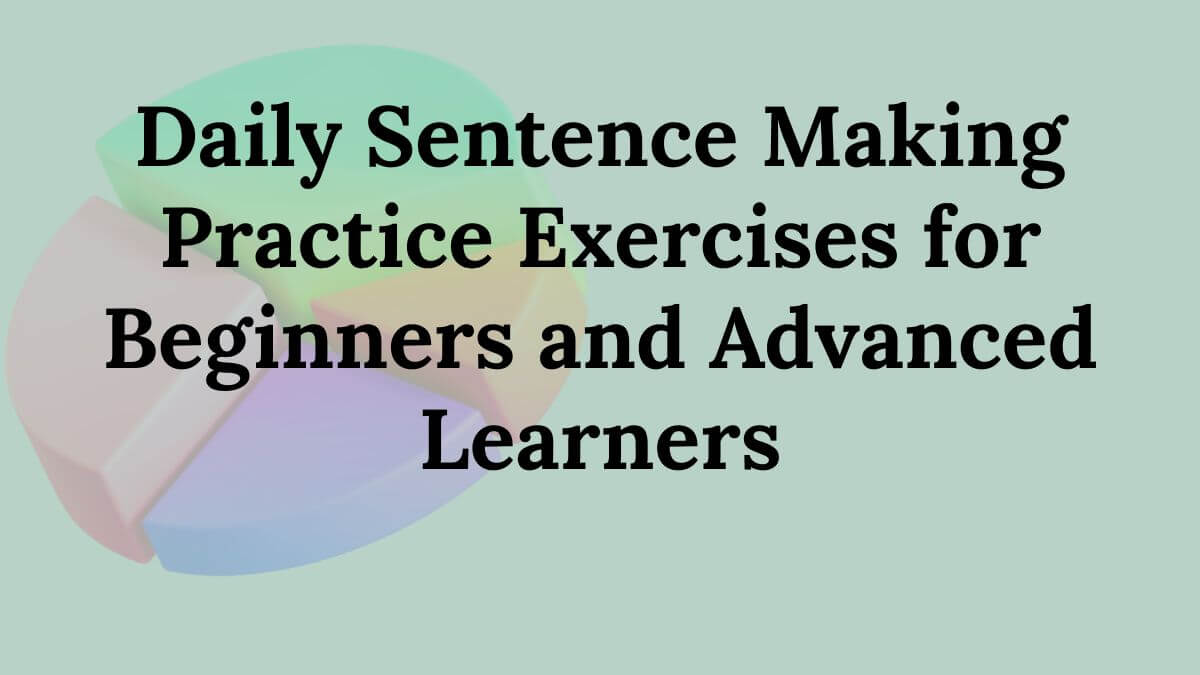Daily sentence making practice is key to mastering English. This guide offers practical sentence-making exercises for both beginners and advanced learners. Creating sentences every day is one of the most effective ways to improve your English communication skills. Whether you’re a beginner trying to form simple, grammatically correct sentences or an advanced learner refining your writing style and sentence structures, daily sentence making practice plays a powerful role in your overall language development.
Practicing sentence construction helps in many ways. For beginners, it builds a solid foundation in grammar, vocabulary, and punctuation. It gives you the confidence to express yourself in English, both in writing and speaking. For more advanced learners, sentence making practice improves clarity, variety, and precision in your communication. Over time, consistent practice leads to natural fluency, allowing you to think and respond in English with ease.
This blog post is specially designed to guide both beginners and advanced learners through effective daily sentence making techniques. You’ll find helpful tips, examples, and a variety of sentence-building exercises to challenge your skills. Whether you are learning English for daily conversation, academic writing, or professional communication, these strategies will help you progress faster and more effectively.
Let’s get started on your journey to becoming confident in making English sentences every day!
Why Daily Sentence Making Practice Matters
Consistent sentence-making exercises help learners actively apply grammar rules and vocabulary. The more you practice forming correct sentences, the more naturally English will come to you.
Daily sentence making practice is not just about memorizing rules—it’s about using the language in real-life situations. It helps train your brain to think in English, improving both your writing and speaking fluency over time.
When you make sentences every day, you also reinforce the grammar structures you’ve learned. You begin to understand how different tenses work, where to place adjectives, how to use prepositions correctly, and how to connect ideas smoothly.
For beginners, it builds confidence. Forming even short, simple sentences like “I am happy” or “She goes to school” gives you the courage to speak up and write clearly.
For advanced learners, sentence making practice enhances creativity and complexity in writing. You can experiment with sentence length, use advanced connectors, and learn to express your thoughts more precisely.
Benefits of Sentence Making Practice
- Improves grammar accuracy
- Boosts vocabulary usage
- Builds sentence structure understanding
- Enhances spoken and written fluency
Daily sentence making practice strengthens both receptive (reading, listening) and productive (speaking, writing) English skills.
How to Start Sentence Making as a Beginner
Start with Simple Sentence Structures
When starting your sentence making practice, begin with the basics:
- Subject + Verb + Object
- Subject + Verb + Complement
Examples:
- I eat rice.
- She is happy.
- They play football.
Use Daily Vocabulary
Make sentences using words you already know. This builds confidence and makes learning enjoyable.
Examples:
- I like mangoes.
- He goes to school.
- We watch TV every night.
Repeat and Reuse
Repetition builds fluency. Try to reuse common sentence patterns by replacing the subject, verb, or object.
Level Up: Sentence Making Practice for Intermediate Learners
Once you’re comfortable with basic sentences, it’s time to expand.
Use Connectors and Conjunctions
Practice connecting ideas using:
- And, but, because, although, so, while
Examples:
- I wanted to study, but the power went out.
- She is tired because she worked all night.
Add Adjectives and Adverbs
Improve sentence variety and clarity.
Examples:
- The tall boy runs quickly.
- She beautifully decorated the room.
Ask and Answer Questions
Asking and answering questions helps you think in English.
Example Questions:
- What do you like to eat?
- Where do they live?
- How do you go to work?
Advanced Sentence Making Practice Techniques
Once you’ve mastered the basics, it’s time to challenge yourself with advanced sentence making practice techniques. These methods help you improve your writing style, enhance your vocabulary usage, and build complex yet clear sentence structures. Here are some powerful strategies for advanced learners:
Try Complex and Compound Sentences
Advanced learners should focus on combining ideas logically.
Compound Sentence Example:
- I wanted to join the course, and my friend encouraged me.
Complex Sentence Example:
- Although it was raining, they went out to play.
Practice Descriptive and Narrative Sentences
Build longer and more detailed sentences to express full ideas or tell short stories.
Examples:
- The boy, who was afraid of water, finally learned how to swim.
- After waking up early and finishing her homework, she went for a walk in the park.
Use Advanced Grammar Structures
Explore passive voice, conditionals, and modals.
Examples:
- The book was written by a famous author.
- If I had studied harder, I would have passed.
- You should finish the task before leaving.
Daily Sentence Making Exercises You Can Do
Practicing English doesn’t have to be boring or complicated. There are many simple yet effective daily sentence making exercises you can do to boost your grammar, vocabulary, and fluency. Start by choosing five new words each day and write a sentence for each. Then, take a basic sentence and expand it using adjectives, adverbs, or prepositional phrases. You can also describe your daily routine in full sentences or write short paragraphs about your favorite topics. Another great exercise is rewriting sentences in different tenses or voices (active/passive) to gain control over sentence structure. Use prompts like “Describe your morning,” “Talk about your weekend plans,” or “Give your opinion on a movie” to keep your writing fresh and focused. Doing these exercises consistently will help you build the habit of thinking in English, making it easier to speak and write confidently over time.
1. Picture Description Practice
Look at a picture and describe what is happening in at least 3 sentences.
Example:
“There is a girl in the kitchen. She is cooking food. The stove is on.”
2. Word-of-the-Day Sentence Making
Learn one new word each day and use it in 3 different sentences.
Example with the word “important”:
- This is an important meeting.
- It is important to drink water.
- My teacher gave me some important advice.
3. Sentence Correction Exercise
Write 3–5 incorrect sentences and try to correct them.
Example:
Wrong: He goes to school every day.
Correct: He goes to school every day.
4. Write About Your Day
Write 4–5 sentences about what you did today.
Example:
I woke up at 6 AM. Then I brushed my teeth. I ate breakfast and went to college. In the evening, I played cricket.
Common Mistakes to Avoid in Sentence Making
1. Incorrect Verb Forms
Always use the correct verb tense according to the time reference.
Wrong: She goes to the market.
Right: She goes to the market.
2. Missing Articles or Prepositions
Don’t forget little words like “a”, “the”, “in”, “on”, etc.
Wrong: I saw an elephant.
Right: I saw an elephant.
3. Word Order Mistakes
Stick to basic English word order: Subject + Verb + Object.
Wrong: Fast, he runs.
Right: He runs fast.
Tips to Make Sentence Practice More Effective
- Practice at the same time daily for consistency.
- Record your sentences and listen for mistakes.
- Use a notebook to track new vocabulary and sentences.
- Read English books or stories and try to mimic their sentence styles.
- Join an online group or find a language partner.
Conclusion: Make Sentence Practice a Daily Habit
The key to mastering English is daily sentence making practice. No matter your level, consistent sentence formation builds fluency and confidence. Start with simple sentences, then gradually include advanced structures. Practice daily using the exercises provided above, and you’ll see improvement in both speaking and writing. Let each sentence you make today take you one step closer to your English fluency goals.

